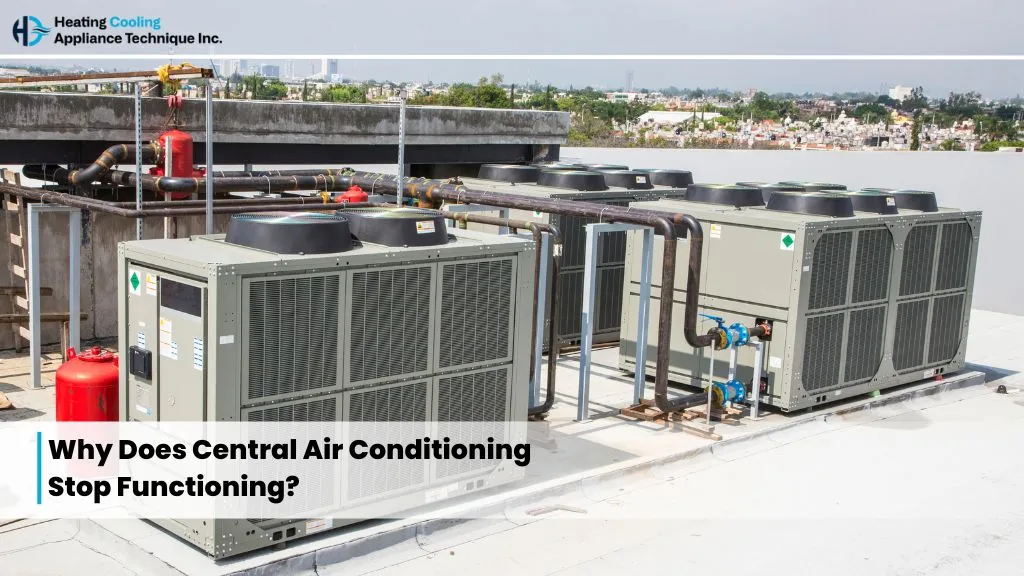
A central air conditioning system is one of the most essential components of modern homes, keeping us comfortable regardless of the weather outside. When it suddenly malfunctions, it can be both frustrating and concerning, especially when temperatures are soaring. For homeowners and HVAC technicians alike, understanding why central air systems stop functioning is crucial to resolving problems quickly and effectively. This article will explore some of the most common issues, their underlying causes, and how they can be addressed.
Common Reasons Your Central Air May Stop Working
Central air conditioning systems can fail for a variety of reasons, ranging from simple, easy-to-fix issues to more complex problems requiring professional assistance. Here’s a breakdown of the typical culprits:
1. Thermostat Issues
The thermostat is the “brain” of your AC system, directing it when to kick on and off. If it’s not functioning correctly, your entire system could be left idle.
Common problems:
- Incorrect settings (e.g., set to “heat” instead of “cool”).
- Dead batteries in programmable thermostats.
- Faulty wiring or outdated thermostats.
Solutions:
- Double-check the thermostat’s settings and replace the batteries if needed.
- If the problem persists, consider upgrading to a smart thermostat or consulting an HVAC specialist.
2. Dirty Air Filters
A clogged air filter restricts airflow, causing your system to work harder and, in some cases, shut down to prevent overheating.
Signs of a dirty filter:
- Reduced airflow from vents.
- Warm air instead of cool.
- Increased energy bills or ice on refrigerant lines.
Solutions:
- Replace the filter regularly—every 1-3 months, depending on usage.
3. Tripped Circuit Breaker
If your AC won’t turn on, the reason could be as simple as a tripped circuit breaker, designed to protect your home’s electrical system.
Steps to troubleshoot:
- Check your circuit breaker box for any switches in the “off” position.
- Flip the breaker back on. If it trips again, consult an electrician to address potential electrical issues.
4. Dirty or Damaged Outdoor Unit
The condenser unit outside your home plays a key role in expelling heat from your system. If it’s blocked by debris or damaged, your AC won’t cool effectively.
Common causes:
- Leaves, dirt, or trash blocking the condenser.
- Bent fins or physical damage to the unit.
Solutions:
- Clear debris and clean the area around the unit regularly.
- If you notice significant damage, call an HVAC technician for repairs.
5. Low Refrigerant Levels or Leaks
Refrigerant is the lifeblood of your AC system, enabling it to cool your home by transferring heat. Low refrigerant levels often point to a leak.
Warning signs:
- Warm air blowing from vents.
- Hissing or bubbling sounds near the unit.
- Ice forming on refrigerant lines.
Solutions:
- Refrigerant issues require professional attention. Certified HVAC technicians can locate leaks, make necessary repairs, and recharge the system.
6. Frozen Evaporator Coils
Evaporator coils are responsible for absorbing the heat inside your home. If they freeze, airflow is blocked, and AC performance plummets.
Why coils freeze:
- Clogged air filters.
- Refrigerant leaks.
- Insufficient airflow due to obstructed ducts.
Solutions:
- Turn off your AC and allow the coils to thaw completely.
- Ensure your air filter is clean and airflow is unobstructed.
- Call a professional if freezing recurs.
7. Compressor Failure
The compressor is the heart of your central air conditioner, responsible for circulating refrigerant. When it fails, your system won’t be able to cool.
Signs of compressor failure:
- AC unit shakes during startup.
- Frequent tripping of breakers.
- Unusual noises like humming or clicking.
Solutions:
- Minor issues, such as electrical faults or oil imbalances, can sometimes be repaired by a professional.
- Severe compressor damage may require a full system replacement, especially if the unit is over a decade old.
8. Frequent Cycling
If your AC is turning on and off too frequently, known as “short cycling,” it isn’t running efficiently and could lead to long-term damage.
Possible causes:
- Thermostat placement in a hot spot (e.g., near a sunny window).
- Refrigerant issues or electrical faults.
- An AC unit that’s improperly sized for your home.
Solutions:
- Verify that your thermostat placement isn’t causing false readings.
- Seek professional help to diagnose underlying issues.
Prevention Through Regular Maintenance
One of the best ways to avoid sudden AC failures is through proactive maintenance. A well-maintained central air system is less likely to break down, saving you time, stress, and money in the long run. Here’s how you can keep your system in top shape:
- Change air filters regularly.
- Keep the outdoor unit clear of debris and ensure at least two feet of clearance around it.
- Clean and inspect condenser coils every season.
- Schedule annual maintenance with a professional HVAC technician to identify and address potential issues early.
When to Call an HVAC Professional
While some troubleshooting steps can be handled by homeowners, others require the expertise of an HVAC professional. You should call an expert if:
- Your AC won’t turn on despite basic troubleshooting.
- You hear strange noises or detect unusual smells.
- Refrigerant leaks, electrical issues, or compressor failures occur.
- Your system is over 10 years old and continually breaking down.
A professional can diagnose complex problems, provide efficient solutions, and recommend whether it’s time to replace an outdated unit.
Final Thoughts
A malfunctioning central air conditioning system can disrupt your comfort and daily routine, but understanding the common causes behind these issues can help you respond effectively. From simple fixes like cleaning air filters to more advanced repairs for compressors or refrigerant leaks, addressing problems promptly ensures your AC continues to run efficiently.
For persistent or complex issues, don’t hesitate to consult an HVAC professional. With regular maintenance and professional care, you can keep your home cool and comfortable even during the hottest months. If you’re experiencing problems with your central air conditioning and need expert help, contact a trusted HVAC service provider today!



